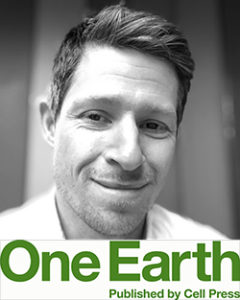
Q&A with the Goldschmidt Non-academic Careers Forum Panellists: Lewis Collins

In a new initiative for Goldschmidt2019 (18-23 August 2019 – Barcelona, Spain) a series of lunchtime discussion forums will be held to give students and post-docs the opportunity to find out more about pursuing careers outside of academia. We have interviewed some of the panellists taking part and will be publishing them on the EAG Blogosphere in the coming weeks. In this first interview, Lewis Collins, Editor-in-Chief of the journal One Earth, talks about his job and the path he took into the world of scientific publishing.
Lewis will be participating in the Goldschmidt2019 Non-academic Careers Forum on Wednesday 21 August at 13:00. Visit the Goldschmidt2019 Early Careers Events webpage for full details of all the events organised for students and post-docs at Goldschmidt2019.
What is your job?
I am the Editor-in-Chief of the journal One Earth – a new top tier publication from Cell Press publishing high-impact, interdisciplinary research and critical perspectives on the world’s grand social-environmental challenges. As the launch EiC for this journal my responsibilities include establishing the vision, aims and scope and publication strategy for the journal; the recruitment, leadership and management of an in-house editorial team; and the handling and curatorship of research and review articles and opinion pieces.
How did you get your job?
Following my PhD and post-doctoral work in climate science I embarked upon a career in editorial with the Nature Research group. I joined Nature Communications as an Assistant Editor and over a period of 5 years climbed to the role of Team Manager, leading Nature Communications’ Earth and Environmental Science editorial team. During this time I developed knowledge of the publishing landscape and skills in manuscript assessment and commissioning, outreach and communication, and recruitment and leadership.
Did you initially plan on this career at the onset of your PhD?
I hadn’t considered a career in publishing during my PhD or post-doctoral studies. Like many people I assumed I would find relevant roles in research and overly depended upon my network and publication record. I hadn’t really considered the value of the transferable skills I had obtained during my studies. While I enjoyed my research, I wasn’t entirely fulfilled, and editorial offered the opportunity to broaden my horizons and reintroduced me to a vast array of subdisciplines within Earth and environmental science beyond the narrow confines of my research.
What advice do you have for PhD students who are thinking of leaving academia?
My advice to anyone currently undertaking a PhD would be to plan ahead, take time to understand the transferable skillset you are acquiring and seek to enhance those skills where possible. Even if you strongly feel your future lies in practicing academia, circumstances can change and it’s much better to be aware of the vast array of options out there rather than panic during the closing months of your PhD or post-doc. Many people consider a career in editorial to be leaving academia – this couldn’t be further from the truth. While you are no longer practicing your own research, editorial provides an incredible opportunity to engage in a vast field of research disciplines.
Interview carried out by the EAG Communications Committee.
